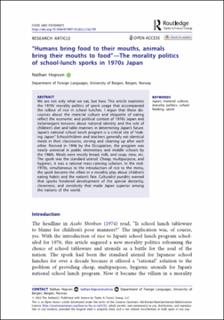“Humans bring food to their mouths, animals bring their mouths to food”—The morality politics of school-lunch sporks in 1970s Japan
Journal article, Peer reviewed
Published version

Åpne
Permanent lenke
https://hdl.handle.net/11250/3047806Utgivelsesdato
2023Metadata
Vis full innførselSamlinger
Sammendrag
We are not only what we eat, but how. This article examines the 1970s’ morality politics of spork usage that accompanied the rollout of rice in school lunches. I argue that these discourses about the material culture and etiquette of eating reflect the economic and political context of 1970s Japan and (re)emergent tensions about national identity and the role of children’s diet and table manners in determining Japan’s future. Japan’s national school lunch program is a critical site of “making Japan.” Schoolchildren and teachers generally eat identical meals in their classrooms, serving and cleaning up after each other. Revived in 1946 by the Occupation, the program was nearly universal in public elementary and middle schools by the 1960s. Meals were mostly bread, milk, and soup, stew, etc. The spork was the standard utensil. Cheap, multipurpose, and hygienic, it was a rational mass-catering solution. In the mid-1970s, simultaneous to the introduction of rice to the menu, the spork became the villain in a morality play about children’s eating habits and the nation’s fate. Culturalist pundits warned that sporks hindered development of the special dexterity, cleverness, and sensitivity that made Japan superior among the nations of the world.
